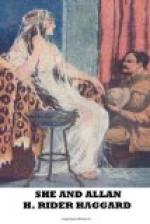Presently the spokesman returned, saluted with his spear, and asked,
“If we go up to fight against Rezu, who will lead us in the battle, O Hiya?”
“My wisdom shall be your guide,” she answered, “this white man shall be your General and there stands the warrior who shall meet Rezu face to face and bring him to the dust,” and she pointed to Umslopogaas leaning upon his axe and watching them with a contemptuous smile.
This reply did not seem to please the man for he withdrew to consult again with his companions. After a debate which I suppose was animated for the Amahagger, men of few words who did not indulge in oratory, all of them advanced on us and the spokesman said,
“The choice of a General does not please us, Hiya. We know that the white man is brave because of the fight he made against the men of Rezu over the mountain yonder; also that he and his followers have weapons that deal death from afar. But there is a prophecy among us of which none know the beginning, that he who commands in the last great battle between Lulala and Rezu must produce before the eyes of the People of Lulala a certain holy thing, a charm of power, without which defeat will be the portion of Lulala. Of this holy thing, this spirit-haunted shape of power, we know the likeness and the fashion, for these have come down among our priests, though who told it to them we cannot tell, but of it I will say this only, that it speaks both of the spirit and the body, of man and yet of more than man.”
“And if this wondrous charm, this talisman of might, cannot be shown by the white lord here, what then?” asked Ayesha coldly.
“Then, Hiya, this is the word of the People of Lulala, that we will not serve under him in the battle, and this also is their word that we will not go up against Rezu. That thou art mighty we know well, Hiya, also that thou canst slay if thou wilt, but we know also that Rezu is mightier and that against him thou hast no power. Therefore kill us if thou dost so desire, until thy heart is satisfied with death. For it is better that we should perish thus than upon the altar of sacrifice wearing the red-hot crowns of Rezu.”
“So say we all,” exclaimed the rest of the company when he had finished.
“The thought comes to me to begin to satisfy my heart with thy coward blood and that of thy companions,” said Ayesha contemptuously. Then she paused and turning to me, added, “O Watcher-by-Night, what counsel? Is there aught that will convince these chicken-hearted ones over whom I have spread my feathers for so long?”
I shook my head blankly, whereat they murmured together and made as though they would go.
Then it was that Hans, who understood something of Arabic as he did of most African tongues, pulled my sleeve and whispered in my ear.
“The Great Medicine, Baas! Show them Zikali’s Great Medicine.”
Here was an idea. The description of the article required, a “spirit-haunted shape of power” that spoke “both of the spirit and the body of man and yet of more than man,” was so vague that it might mean anything or nothing. And yet——




